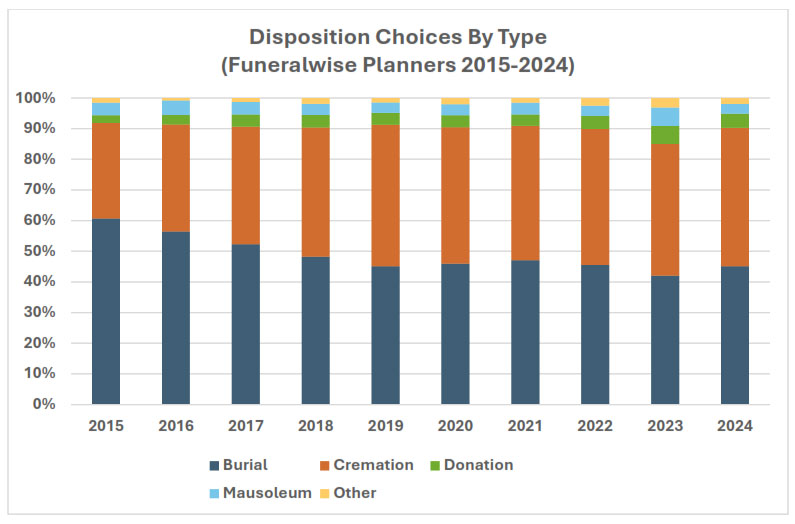Funeral Planning: How To Plan A Funeral
Step-by-step Guide to Planning Your Own FuneralHow to Plan A Funeral: Summary
Planning your funeral is a thoughtful way to ease the emotional and financial burden on your loved ones. This guide outlines a step-by-step approach:
- Plan Ahead: Even a simple plan can be invaluable to your family.
- Decide on Interment: Choose between burial, cremation, or other options.
- Choose Service Options: Select the type of service you want.
- Estimate Costs: Assess expected expenses and adjust your choices to stay within your budget.
- Communicate Your Plan: Share your decisions with family or a trusted individual.
- Detail the Ceremony: Specify elements like readings, music, and participants.
- Arrange Financing: Explore options such as funeral insurance, trusts, or pre-purchase services.
- Organize Personal Information: Document key personal details to assist with eulogies, obituaries, and genealogical records.
Thinking about the end-of-life is tough. But planning your funeral in advance offers peace of mind for both you and your loved ones. Using tools like the After Me Planner and Organizer can simplify the funeral planning process. The Planner allows you to create, manage, and share your plans conveniently.
Why Plan Ahead for Your Funeral?
Preplanning your funeral helps ease the burdens for your family and loved ones after you’re gone. When someone passes, the family faces emotional, financial, and legal burdens. The purpose of planning is to prepare them to deal with these burdens. It’s a thoughtful and loving thing to do for the people you care about most.
Important: Do You Need to Make Funeral Arrangements Now? If you need to plan for someone who has passed away or is close to it, check out our funeral arrangements page. Here you’ll find step-by-step guidance on the next steps.
Video: See the Quick Way to Start Your Funeral Planning
Funeral Planning: Step-By-Step
- Plan ahead. Planning is the best thing you can do. Your plan doesn’t need to be complicated. Even a simple plan can help your family.
- Make Interment choices (i.e., burial, cremation, donation to medical science, burial at sea). And funeral service choices (i.e., a traditional funeral, a memorial service, a graveside service, or no service).
- Decide on Service Options. There are several options for selecting the type of service you prefer. Do you want to have a funeral service (the body is present)? Would you prefer a memorial service (no body)? Would you like to include a Celebration of Life?
- Specify the details of your funeral ceremony. There are no hard and fast rules regarding the level of detail you want in your funeral design. For some people, a simple outline is enough. For others, specific information, down to which readings will be used and which music will be played, is more appropriate.
- Estimate the cost of your funeral. Our After Me Planner has tools to help you determine the price for your selections. If the estimate is higher than you’d prefer, you can adjust your choices. Remember that a funeral does not have to be expensive to be meaningful. Focus on the aspects that are significant to you.
- Share your funeral plan with your family so they know your wishes. Pick a trusted family member, friend, or advisor to be primarily responsible for carrying out your wishes. Start with your basic plan, then update it as you add details over time.
- Make financial arrangements to pay for your funeral. Determine if you will have enough money to cover the funeral costs and other final expenses. Consider funeral insurance, a trust, pre-purchasing cemetery space, and a pre-need contract for funeral services.
- Organize and document your key personal information. This is important for sorting out your affairs and will help those giving eulogies and writing your obituary. Also, consider what you might want to leave behind for future genealogical purposes. Future generations in your family will appreciate all of this information.
How Long Does It Take to Plan a Funeral?
The time required to plan a funeral varies. The time required depends on the service you choose and who is involved in the decision-making. A traditional funeral with a viewing can take 1-2 weeks to arrange. Many decisions need to be made. Will everyone agree?
Scheduling the funeral can extend the timeline. What is the availability of the funeral home or venue? Will family members need to make travel arrangements? Some religious or cultural requirements require burial within 24 hours. Others include a multi-day ritual. Having a plan in place ahead of time will help with decision-making and organize the process.
Funeral Planning with our After Me Planner
Our After Me Planner and Organizer is a complete DIY method for preplanning your funeral and organizing all the vital information your family will need at the end of your life. The planner includes simple online tools to keep you organized and guide you through the process. The complete system consists of a case and accessories to store your essential documentation. When you use the After Me Planner and Organizer, you’re in control. You’ll be able to create, manage, store, and share your plans and key documents easily.
The Quick Plan is the first step of our After Me Planner. It’s a great way to jump-start your funeral planning. Once you have created a Quick Plan, be sure to save it. Once you do, you’ll unlock the additional features of the free Essentials version of the planner. With Essentials, you can easily share your plan with others and manage your expected final expenses.
Prefer to work on paper? For those who prefer to put their funeral plans on paper, our Funeral Planning Form is the perfect place to start. This handy funeral planning checklist will help you compile all the information you need in one convenient location.
Funeral Planning Tips and Advice
- When to Plan Ahead: The best time to plan ahead for a funeral is not at the time of the funeral itself. After all, you wouldn’t try to plan a wedding in just a few days. A funeral is the ultimate celebration of your life. Planning ahead gives you the chance to decide what you want, how you want it, and when you want it. Best of all, you aren’t locked in. If you change your mind, update your plan. Check out our article on Funeral Preplanning to learn more about how to get started.
- Funding Pre-planned Funerals: Deciding whether to pay for your funeral in advance can be confusing, but there are many reasons to consider it. You’ll feel reassured knowing the funds are available to cover the costs. Even better, the burden will be taken off those you leave behind, and you can lock in prices.
- Changing Funeral Contracts: Be sure to carefully review all terms of your contract before signing. Some contracts allow changes over time, while others do not.
- Paying in Advance: As with most things, there are pros and cons to paying for funeral goods and services in advance. Whether it’s right for you depends on your circumstances. You want to ensure that the arrangement you enter into will meet your needs in the future. Carefully read the overall terms and conditions, including the fine print.
- Planning Ceremony Details: Get great advice on planning funeral or memorial services in Funeral Ceremonies. Tips for writing Eulogies and Obituaries are also available.
- Green Pre-Planning: Green burial is a relatively new option, but it is gaining popularity. Pre-planning is the perfect time to investigate your options. Visit our Green Burial section to explore all available options.
- Your Family and Grief. Your funeral isn’t just about you. It is vitally essential for your family. They will want to give you a meaningful tribute. A funeral for a loved one is an integral part of the healing process. It’s a time for your family to remember, bid farewell, and embark on a new stage of life.
How To Pay Funeral Costs

Several factors contribute to the cost of a funeral. From the services provided by the funeral director to the casket to the flowers, costs continue to rise. Today, a traditional funeral can easily cost more than $10,000.
Leaving behind no mechanism to pay for these items can place a heavy financial burden on your loved ones. Remember, payment is due at the time of the funeral.
How do you determine how much to set aside and how to control costs? The best way to manage your funeral costs is to plan ahead.
Check out our Funeral Costs section. It explains the factors that drive funeral expenses and highlights the financial and legal considerations you should consider.
What Type of Funerals Do People Choose?
Thousands of people use our free online planning tools. These tools help you make key choices about the type of funeral that best suits your unique needs. We can also help you determine the cost of the kind of funeral you have in mind.
Below, you can see examples of some of the choices people make when they create their funeral plans. You have plenty of options, and there is no right or wrong way to make your decisions. The point is, the best time to plan your funeral is BEFORE you need it.

Users’ disposition choices in the After Me Planner largely align with national trends.
- Traditional burials are still a popular choice, but the use of cremation is on the rise.
- In 2015, more than half of planners selected burial. By 2024, planners were almost evenly split between cremation and burial.
- The preference for donating to science has remained steady over the past decade, fluctuating between 5% and 10%.
For more information on funeral trends, visit our Funerals By the Numbers Page.
Don’t Leave Your Loved Ones Unprepared
It’s not easy to think about end-of-life. Nobody wants to plan a funeral. But let’s face it, we all have to do it at some point. The important thing is that you take the opportunity to make your own choices and design the sendoff you want.
Planning is a caring thing to do for your family. You are giving them the peace of mind that comes from knowing they can celebrate your life and honor your wishes.

